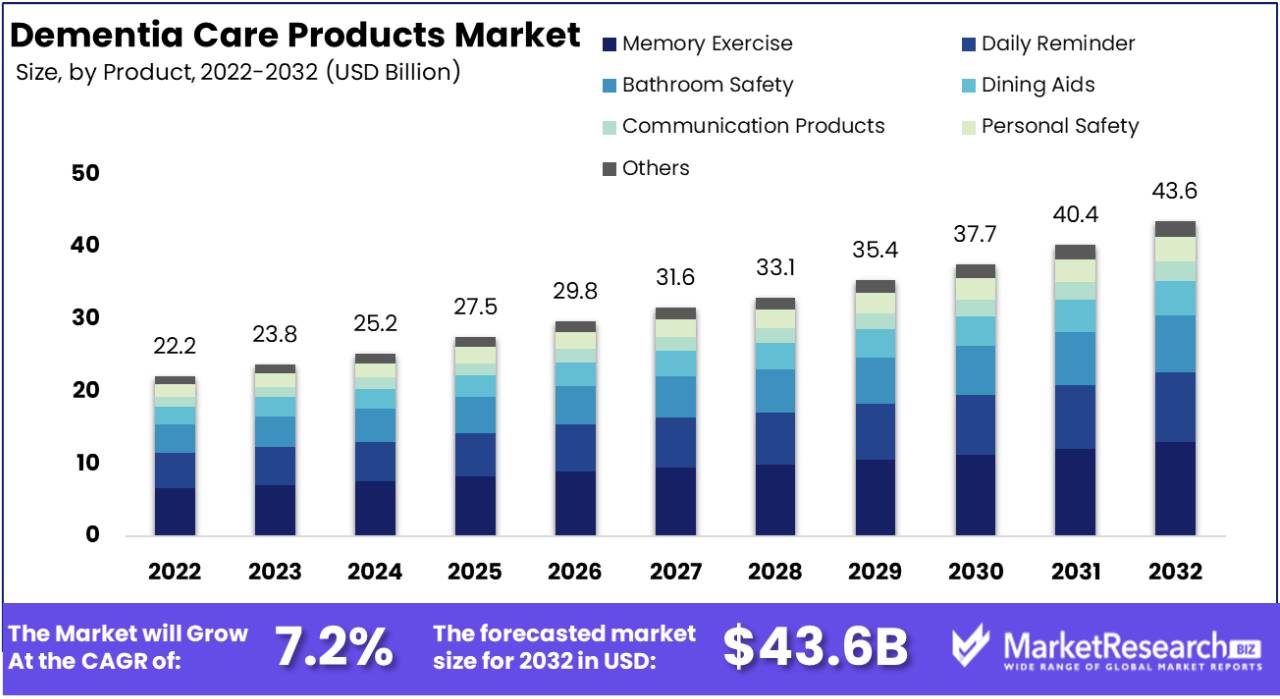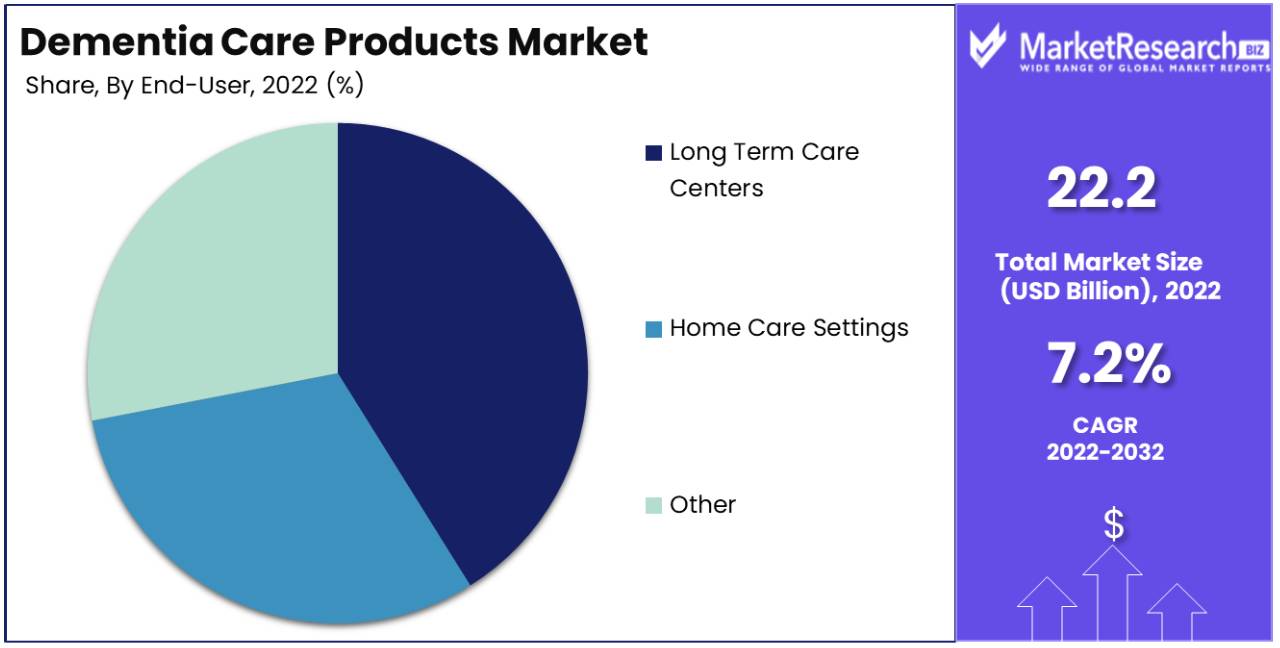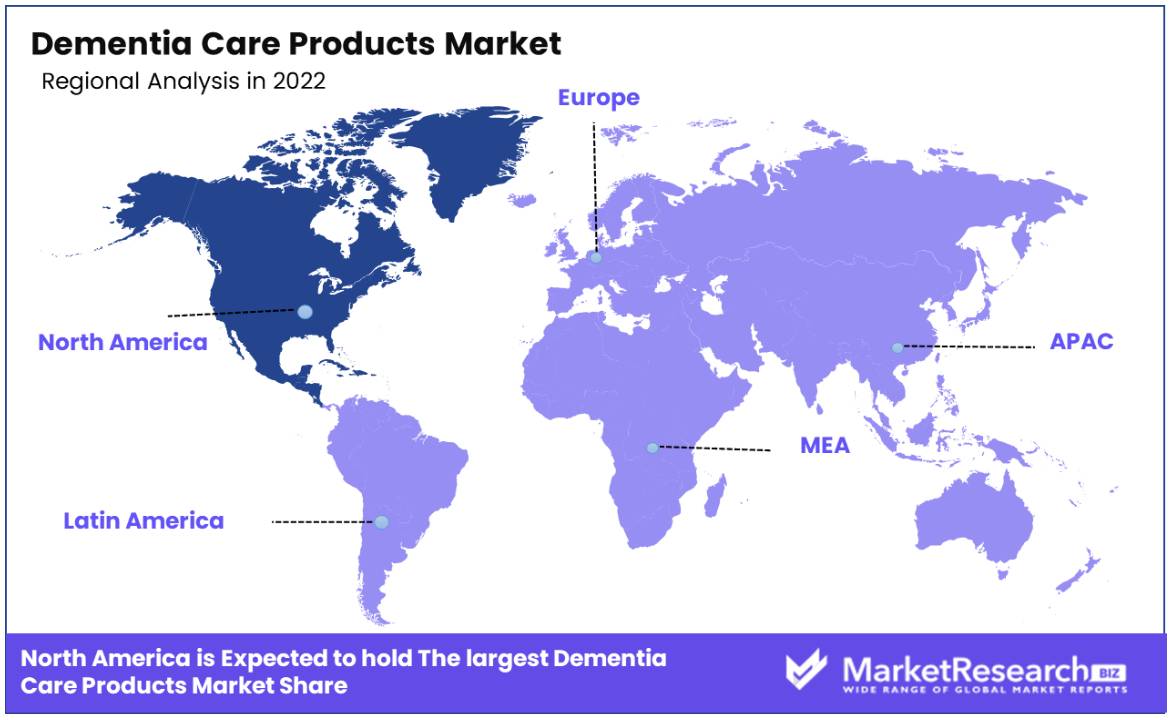
Dementia Care Products Market By Type(Memory Exercise & Activity Products, Daily Reminder Products, Others), By End-User(Long Term Care Centers, Home Care Settings, Other), By End-User(Individuals, Foodservice Establishments), By Region And Companies - Industry Segment Outlook, Market Assessment, Competition Scenario, Trends, And Forecast 2023-2032
-
21162
-
Nov 2023
-
179
-
-
This report was compiled by Shreyas Rokade Shreyas Rokade is a seasoned Research Analyst with CMFE, bringing extensive expertise in market research and consulting, with a strong background in Chemical Engineering. Correspondence Team Lead-CMFE Linkedin | Detailed Market research Methodology Our methodology involves a mix of primary research, including interviews with leading mental health experts, and secondary research from reputable medical journals and databases. View Detailed Methodology Page
-
Quick Navigation
Report Overview
Dementia Care Products Market size is expected to be worth around USD 43.6 Bn by 2032 from USD 22.16 Bn in 2022, growing at a CAGR of 7.2% during the forecast period from 2023 to 2032.

The sudden rise of traumatic brain injuries and neurodegeneration disorders like Parkinson’s disease and Alzheimer's disease are some of the key driving factors in the dementia care product. The surge in incidences of many associated risk elements that include aging, genetic mutation, high blood pressure, and build-up of abnormal protein deposits in the brain are also expanding the market growth.
Additionally, non-pharmacological interventions like cognitive stimulation, music therapy, and physical exercise that aim to enhance cognitive function, mood, and behaviors are also driving market growth. Furthermore, antipsychotic medications like Risperidone and Olanzapine which treat hallucinations aggression agitation acts as significant market growth catalysts.
There has been an unprecedented global surge in cases, creating an opportunity for dementia care products to fill this market niche. According to WHO estimates, cases will double every 20 years from 2030-2050 reaching 66 million in 2030 and 116 million by 2050; approximately 22 percent of the global population over 60 will have dementia with four-fifths residing either in Asia or Africa.
It is also projected that over 5 million individuals in India have dementia, of which Alzheimer’s is the most common disease. According to the Alzheimer’s and Related Disorder Society of India, there will be a surge of cases to 8 million by 2030. Unfortunately, with no effective treatment available to reverse its progression, Alzheimer's only gets worse with time - possibly leading to its death.
A rising prevalence rate for dementia patients can be observed across lower or middle-income developing nations compared to highly developed ones, creating an opportunity in the industry for companies looking to broaden their reach globally. The cost-effectiveness and high quality are highly considerable and can produce strong market sales for the organization. The advanced trends in healthcare and solutions will likely enhance the market for dementia care.
Driving factors
Cost-effective and High-Utility Products Enhance Market Accessibility
The availability of cost-effective and high-utility dementia care products significantly enhances industry accessibility. Products that offer high value for money and are practical for everyday use attract a broader customer base, especially in cost-sensitive markets. Affordable products are particularly important in low and middle-income countries, where resources for specialized care may be limited.
Manufacturers focusing on cost-effective solutions help democratize access to care, ensuring that more individuals can benefit from these products. This affordability, combined with high utility, encourages wider adoption and sustained market growth.
High Prevalence of Dementia in Low or Middle-Income Countries Expands Market
The high prevalence of dementia in low or middle-income countries is expanding the dementia care products market. In these regions, the aging population and lack of robust healthcare infrastructure amplify the challenges of dementia care. The demand for products that can aid in dementia management at home or in community settings is therefore significant.
As awareness in these regions grows and access to healthcare improves, the demand for dementia care products is expected to rise. This trend suggests a growth in developing countries, with opportunities for tailored products that meet specific cultural and economic needs.
Rising Number of Dementia Cases Amplifies Market Growth
The rising number of dementia cases globally is a primary factor amplifying the growth of the dementia care products market. As the global population ages, the incidence of dementia increases, creating a growing need for products and solutions to manage and alleviate its symptoms.
This increase in dementia cases is driving demand across all sectors of the market, from low-tech aids like simplified remote controls and signage to high-tech solutions like GPS trackers and automated home systems. The ongoing rise in dementia prevalence is likely to continue driving market growth, with an increasing emphasis on innovation and product development to address the evolving needs of this population.
Restraining Factors
Limitation of Product Accessibility and Affordability in Remote Areas Restrains Dementia Care Products Market Growth
The accessibility and affordability of dementia care products in remote areas significantly restrain market growth. In these regions, the distribution channels are often less developed, leading to difficulties in product availability. Additionally, the economic constraints faced by individuals in remote areas can make it challenging for them to afford dementia care products, even if available. This combination of limited access and affordability issues prevents a significant portion of the potential market from utilizing these essential products, thereby hampering overall market growth.
Limited Availability and High Cost of Advanced Dementia Management Products Restrains Market Growth
Advanced dementia management products pose major obstacles to market expansion. While such advanced products often incorporate cutting-edge technology for monitoring and aiding dementia patients, they tend to be more costly than their equivalent traditional alternatives, making them inaccessible to a broader audience. Furthermore, many regions, particularly less developed markets, do not readily stock such advanced products, restricting them only to specific segments of the population and ultimately restricting market expansion.
Limited Access to Quality Dementia Care Facilities in Developing Countries Restrains Market Growth
In developing countries, limited access to quality dementia care facilities significantly impacts the growth of the dementia care products market. The lack of adequate healthcare infrastructure and specialized dementia care services means that the demand for related products is also limited. The absence of such facilities reduces the awareness and understanding of dementia care needs, further affecting the market's potential. Expanding these facilities and improving healthcare services in these regions are crucial for the growth of the dementia care products market.
Strict Requirements for Medication Development and Clinical Trials Hamper Dementia Therapeutics and Diagnostics Market Expansion
A key barrier to expansion in the dementia therapeutics and diagnostics market will likely be met by stringent requirements for medication development and clinical trials. Treating dementia requires extensive investment in research and development; regulations ensuring efficacy add yet another layer of difficulty; these rigorous processes often lead to longer development times and increased costs, slowing the introduction of new products into the industry as well as stunting its expansion.
Segmentation Analysis of Dementia Care Products Market
By Type Analysis
Memory exercise and activity product types are pivotal in dementia care, designed to slow cognitive decline and improve the quality of life for individuals with dementia. These products include games & puzzles, and software applications that stimulate cognitive functions. The increasing awareness of the benefits of cognitive stimulation in dementia care drives the growth in this segment. As research continues to emphasize the importance of mental engagement in dementia patients, these products are becoming integral in both institutional and home care settings.
Daily reminder products, such as clocks and automated medication dispensers, assist with routine tasks and medication management. Bathroom safety products, including grab bars and anti-slip mats, are crucial to prevent accidents. Dining aids like adapted utensils and plates facilitate independent eating. Communication products help maintain interaction, while personal safety products like wearable GPS devices ensure the safety of patients who may wander. Each sub-segment addresses specific challenges faced by dementia patients and their caregivers, contributing to the market's comprehensiveness.
By End-User Analysis
Long-term care centers are the primary end-users of dementia care products. These facilities provide comprehensive care and supervision, making them ideal for patients with advanced dementia. The range of products used in these settings is extensive, catering to various aspects of patient care and safety. The growth in this segment is influenced by the rising number of dementia cases globally and the increasing demand for specialized care facilities.

Home care settings are becoming increasingly significant as many families prefer to care for dementia patients at home for as long as possible. Products designed for home use are tailored to ease the burden on caregivers and enhance patient safety and comfort in a familiar environment. Other end-users include community centers and outpatient clinics that provide support and resources for care.
Key Market Segments
By Type
- Memory Exercise & Activity Products
- Daily Reminder Products
- Bathroom Safety Products
- Dining Aids
- Communication Products
- Personal Safety Products
- Others
By End-User
- Long-Term Care Centers
- Home Care Settings
- Other
Growth Opportunity
Rising Geriatric Population and Dementia Patients Drive Significant Growth in the Dementia Care Products Market
The simultaneous increase in the geriatric population and the number of individuals affected by dementia presents substantial growth opportunities in the dementia care products market. As the aging demographic expands, so does the prevalence of dementia, driving demand for specialized care products. Companies offering innovative and effective care solutions are poised for growth, serving a growing industry of individuals and caregivers in need. This trend aligns with the broader aging population demographic shift, significantly contributing to the expansion of the dementia care products market. The Dementia Care Products Market holds the largest market share due to growing awareness of dementia, resulting in a high growth rate and increased demand for memory supplements.
Adoption Trends for Healthcare Products and Services Boost the Dementia Care Products Market
The adoption of key trends for healthcare products and services is likely to improve the market for dementia care. As consumers increasingly prioritize health and well-being, they seek effective care solutions. Companies that align with these evolving consumer preferences, emphasizing quality, ease of use, and effectiveness, are well-positioned for growth. This trend reflects the broader shift towards proactive healthcare and contributes to the overall expansion of the dementia care products market.
Focus on Long-Term Care Shapes the Dementia Care Products Market
Solutions designed for long-term care play a pivotal role in shaping the dementia care products market. Dementia care often lasts a lengthy journey, making products specifically targeted towards long-term needs in high demand. Companies providing comprehensive and sustainable care solutions focused on the long-term well-being of individuals living with dementia as well as their caregivers are poised for growth due to increased recognition of holistic care - ultimately contributing to expanding dementia care product markets further.
Regional Analysis
North America Dominates with 36.70% Market Share in the Dementia Care Products Market
North America holds a 36.70% share of the dementia care products market and can be seen to dominate due to several contributing factors. An aging population leads to an increased prevalence of dementia-related disease treatment. Furthermore, awareness and understanding of dementia within North America contribute to a higher demand for specialized products.
North America's market dynamics are further defined by advanced healthcare infrastructure, substantial investments in research, and a variety of dementia care products that are widely available. Furthermore, North America enjoys being home to numerous leading companies that specialize in dementia care innovations.
Forecast indications show that the dementia care products market in North America will experience continued growth due to an increasing incidence of dementia and Alzheimer's disease segment as well as rising healthcare spending. Furthermore, product innovation could provide tailored care solutions tailored to specific dementia patient needs.

Europe:
Europe holds an integral part in the global dementia care product. This can be attributed to its high standards of healthcare, government funding for dementia care initiatives, and an aging population; European nations have been at the forefront of developing dementia strategies and policies that contribute directly to the growth of this industry.
The European market for dementia care products is projected to experience steady expansion, driven by ongoing healthcare initiatives and increasing public and private investments in dementia research as well as an ever-increasing demand.
Asia-Pacific:
The Asia-Pacific region is experiencing rapid expansion in the dementia care products market. Factors such as increasing life expectancy, rising healthcare awareness and the growing prevalence of dementia contribute to this growth. The region’s healthcare infrastructure is developing rapidly, and there is a growing middle class able to afford care.
The future of the dementia care products market in Asia-Pacific looks promising, with potential growth driven by increasing healthcare expenditure, government initiatives in healthcare, and the rising awareness and social acceptance of dementia as a significant health issue. This industry is also expected to benefit from increasing local and international investment in healthcare facilities.
Key Regions and Countries
North America
- The US
- Canada
- Rest of North America
Europe
- Germany
- France
- The UK
- Spain
- Italy
- Russia
- Netherlands
- Rest of Europe
Asia-Pacific
- China
- Japan
- South Korea
- India
- New Zealand
- Singapore
- Thailand
- Vietnam
- Rest of Asia Pacific
Latin America
- Brazil
- Mexico
- Rest of Latin America
Middle East & Africa
- South Africa
- Saudi Arabia
- UAE
- Rest of Middle East & Africa
Key Players Analysis
The dementia care products market is shaped by a combination of senior living providers and specialized healthcare product companies, each contributing to the evolving needs of dementia care. Brookdale Senior Living, Sunrise Senior Living, and Atria Senior Living are notable for their comprehensive care services, offering tailored living environments and support systems for individuals with dementia. Their strategic positioning is underpinned by a focus on enhancing quality of life and providing holistic care.
Life Care Services, Five Star Senior Living, and Erickson Living have established themselves as major players in the senior living sector, integrating specialized care programs and facilities into their services. This approach underscores their commitment to addressing the unique needs of residents with dementia.
Kensington Park Senior Living and Masonicare stand out for their localized, community-oriented approach, offering dedicated support and care in a more personalized setting. ProMedica Health System, Inc. and Azura Memory Care have a significant impact on healthcare integration, providing both residential care and medical services tailored to patients.
Best Alzheimer's Products and Healthcare Products LLC specializes in the development and distribution of products specifically designed to improve the daily lives of individuals with dementia. Their influence is marked by a focus on innovative solutions that aid in memory support, safety, and engagement.
Collectively, these key players drive the dementia care products market through a blend of specialized care services, innovative product offerings, and a focus on enhancing the safety, well-being, and quality of life for individuals with dementia and their caregivers.
Top Key Players in the Dementia Care Products Market
- Brookdale Senior Living
- Sunrise Senior Living
- Life Care Services
- Five Star Senior Living
- Atria Senior Living
- Erickson Living
- Kensington Park Senior Living
- Masonicare
- ProMedica Health System, Inc.
- Azura Memory Care
- Best Alzheimer's Products
- Healthcare products LLC
- EasierLiving, LLC
- Parentgiving, Inc.
- Find memory care
- NRS Healthcare
- Buddi Ltd
- Eli Lilly And Company
Recent Development
- In September 2021, Parentgiving Inc., the largest retailer in the country of products to help care for the aged, announced the expansion of its Dry Direct incontinence line adding top-of-the-line Italian softness, comfort, and performance that consumers have come to are looking for from the market top brand in incontinence products.
- In January 2021, Hill-Rom Holdings, Inc. bought Bardy Diagnostics, Inc. one of the leading providers of solutions for monitoring the heart as a way to expand its offering of connected-care solutions.
- In June 2021, Biogen and Eisai. Ltd. declared that the U.S. Food and Drug Administration (FDA) has granted accelerated approval to ADUHELM(tm) (aducanumab-avwa) to be the first and sole Alzheimer's disease treatment to treat an underlying pathology that causes the disease through reducing amyloid-beta plaques that form in the brain.
- In June 2020, The time that ArjoHuntleigh announced its brand new dementia-related product, called The earlySense Live Incontinence Solutions which was designed to help caregivers deal with incontinence among those suffering from dementia.
Report Scope
Report Features Description Market Value (2022) USD 22.16 Bn Forecast Revenue (2032) USD 43.6 Bn CAGR (2023-2032) 7.2% Base Year for Estimation 2022 Historic Period 2016-2022 Forecast Period 2023-2032 Report Coverage Revenue Forecast, Market Dynamics, COVID-19 Impact, Competitive Landscape, Recent Developments Segments Covered By Type(Memory Exercise & Activity Products, Daily Reminder Products, Bathroom Safety Products, Dining Aids, Communication Products, Personal Safety Products, Others), By End-User(Long Term Care Centers, Home Care Settings, Other) Regional Analysis North America - The US, Canada, Rest of North America, Europe - Germany, France, The UK, Spain, Italy, Russia, Netherlands, Rest of Europe, Asia-Pacific - China, Japan, South Korea, India, New Zealand, Singapore, Thailand, Vietnam, Rest of Asia Pacific, Latin America - Brazil, Mexico, Rest of Latin America, Middle East & Africa - South Africa, Saudi Arabia, UAE, Rest of Middle East & Africa Competitive Landscape Brookdale Senior Living, Sunrise Senior Living, Life Care Services, Five Star Senior Living, Atria Senior Living, Erickson Living, Kensington Park Senior Living, ProMedica Health System, Inc., Azura Memory Care, Best Alzheimer's Products, Healthcare Products LLC, EasierLiving, LLC, Parentgiving, Inc., Find memory care, NRS Healthcare, Buddi Ltd, Eli Lilly And Company Customization Scope Customization for segments, region/country-level will be provided. Moreover, additional customization can be done based on the requirements. Purchase Options We have three licenses to opt for: Single User License, Multi-User License (Up to 5 Users), Corporate Use License (Unlimited User and Printable PDF) -
-
- Brookdale Senior Living
- Sunrise Senior Living
- Life Care Services
- Five Star Senior Living
- Atria Senior Living
- Erickson Living
- Kensington Park Senior Living
- Masonicare
- ProMedica Health System, Inc.
- Azura Memory Care
- Best Alzheimer's Products
- Healthcare products LLC
- EasierLiving, LLC
- Parentgiving, Inc.
- Find memory care
- NRS Healthcare
- Buddi Ltd
- Eli Lilly And Company




